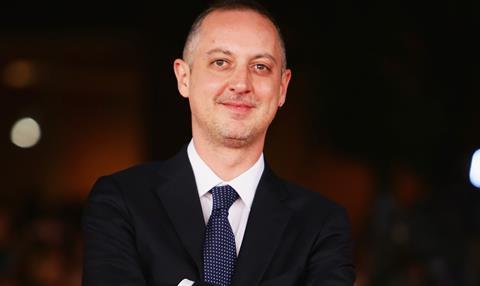The Italian director discusses trading gritty TV series Gomorrah for love story Alaska.

Claudio Cupellini takes a step back from his directing work on the acclaimed gangster series Gomorrah, and instead puts a spotlight on the fragility of young love in his new film Alaska.
Debuting to a packed house at the Rome International Film Festival - with the Italian release set for November 5 - stars Elio Germano (Suburra, Romanzo Criminale) and Astrid Berges-Frisbey (Pirates Of The Caribbean: On Stranger Tides) give an honest portrayal of two people obsessed with success and their relationship - a topic Cupellini has been wanting to explore for years.
This is a departure from Gomorrah and your previous film A Quiet Life. What inspired you to direct a film about a relationship?
I wanted to do a film that was full of life, that tells the truth behind love, its turning points and its tragedies. So the story of Nadine (Berges-Frisbey) and Fausto (Germano) is more than a traditional love story: it is about obsession, rapacity and crazy ambition which lie in the heart of the world - a world in which few people have a lot and all those who don’t keep staring at the fake light, believing they are nothing.
Elio [Germano] and Astrid [Berges-Frisbey] have a strong chemistry together - they bring a rawness to their characters. What was the rehearsal process like?
I left them alone together for two months before we started shooting. The film takes place in the world of fashion so we decided to shoot in Paris and Milan. Both characters needed to know Italian and French. Elio helped Astrid learn Italian and Astrid helped Elio learn French. I think this helped create a great bond between them. They are both very talented how they can make their acting look effortless.
Music plays a strong role throughout the film, with many tracks contrasting the emotions on screen. Can you talk about that?
It was my first time working with composer Pasquale Catalano and he had the idea of using different style tracks, such as an operatic piece in an intensive scene. In another emotionally driven scene, I used The Supreme’s “My World Is Empty Without You”. I think it helps give added texture - melancholy but with happiness. I am obsessed with music. I used a lot of popular music like Blonde Redhead, Interpol and an Italian band called Jennifer Gentle.
Can you talk about your work on Gomorrah?
There are three of us that direct the series [Stefano Sollima and Francesca Comencini], and it is decided before shooting begins who is directing which episode. I worked on three episodes for Series 1 and I am currently shooting four episodes for Series 2. It is interesting the way it is made - it has a very particular documentary feel with hand-held camera work. We shoot with a wide lens so the viewer can see everything that is happening. But different to some American shows, we always more or less keep the same style of shooting for each episode.
Will the arrival of Netflix affect the development of television programming in Italy?
I hope it will give Italy more incentive to produce television series without the need to already have an existing book or film. I think we have a lot of great writers/directors here so I hope this allows for more Italian-backed productions. Stefano [Sollima] is great at doing this - he is not afraid to build a project from scratch (Suburra). Paolo Sorrentino’s The Young Pope is another good example.
What is your next project?
I have a few ideas - nothing specific at the moment. Once I finish Gomorrah, I am going to focus on writing a new feature film.
Alaska is an Italian/French co-production (Indiana Productions/ Rai/ 2.4.7 Films in association with B Media 2012 and Backup Media) and will be released on an estimated 250 prints by RAI Cinemas in Italy on November 5. Films Distribution is handling international sales.

























No comments yet